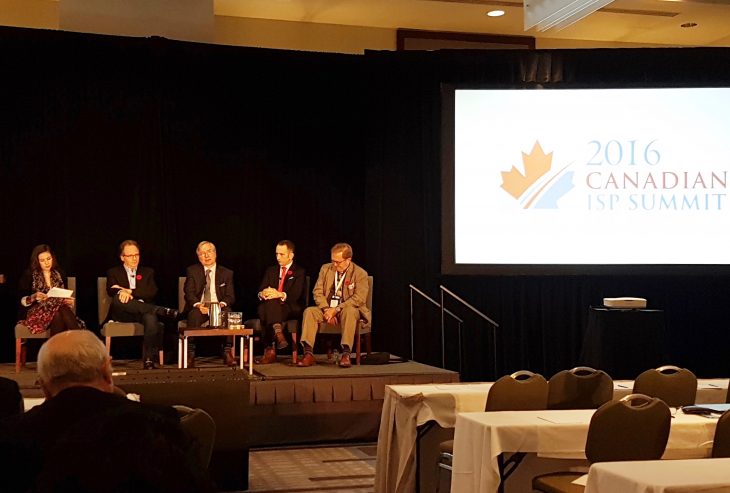
TORONTO – With more than 350 delegates, a strong group of sponsors and vendors and 21 educational sessions, the 2016 Canadian ISP Summit was the biggest edition yet.
Focused on independent ISPs like Teksavvy, Distributel, Sogetel and Execulink, the annual gathering is a place to hear war stories, get the latest and greatest in tech developments, hear marketing successes and, of course, regulatory wins and losses.
2016 has featured a few wins for the independent ISPs on the wholesale wireline front, especially (even though that still isn’t over, yet).
The final session of the Summit on Wednesday revisited a lot of the recent regulatory activity in Gatineau thanks to (right to left in the photo) lawyer and former CRTC commissioner Tim Denton, Public Interest Advocacy Centre counsel Geoff White, Canadian Network Operators Consortium lawyer Christian Tacit of Tacit Law, and University of Ottawa law professor Michael Geist, with Globe and Mail telecom reporter Christine Dobby.
The group covered the Quebec government’s severely misguided Bill 74, which would force ISPs in the province to block their customers from surfing to online gambling web sites, in the hope of maintaining the provincial monopoly on lottery and gambling.
“It will impose significant costs on ISPs and is likely to be technically futile,” said Denton, “but they don’t know that yet… It’s a downright stupid approach to managing their gambling monopoly.”
The panel also used a few minutes to re-hear last week’s differential pricing hearing, where White insisted ISPs “shouldn’t be able to pick and choose which content is favoured, through billing practices.”
Geist noted it was very interesting to see how the big ISPs didn’t all stand together as one on the issue. For example, Rogers was unequivocal in saying DPP should not be allowed while Bell and Vidéotron (whose Unlimited Music was the reason the hearing was called) supported DPP. Telus came down sort of in the middle – as did CNOC. This level of discord among the ISPs is unusual, he said, because when it comes to appearing in front of the Regulator, there is usually more homogeneity with companies of similar size. (Search “DPP Hearing” on Cartt.ca to see our daily coverage from last week.)
Tacit responded that CNOC’s argument was more that the CRTC already has DPP under control with its Internet Traffic Management Practices decisions and doesn’t really need a new layer of retail regulation on top of that, save for preventing vertically integrated companies from favouring their own content. Dealing with DPP should be left to ex poste (deciding on a case-by-case basis, depending on complaints).
All panelists said they would be surprised if the Commission made any determination on data caps from last week’s proceeding. While they sure talked about it a lot, it wasn’t the reason behind calling the hearing in the first place and it didn’t seem as though the panel of commissioners was moving towards any move there.
The group also rehashed the spring’s basic service objective hearing, the so-called Talk Broadband process, which there has yet to be a decision announced and how the industry must do a better job servicing low income households with affordable broadband.
However, should that support come direct from government, or ISPs? While the industry is profitable, it doesn’t exactly seem fair for the federal government to force industry to fund all of a social good like low income broadband support. It’s “orders of magnitude more than of what the telecommunications industry is able to fund on its own,” said Tacit.
“I don’t think the federal government and the provincial governments have done enough,” added Geist.


